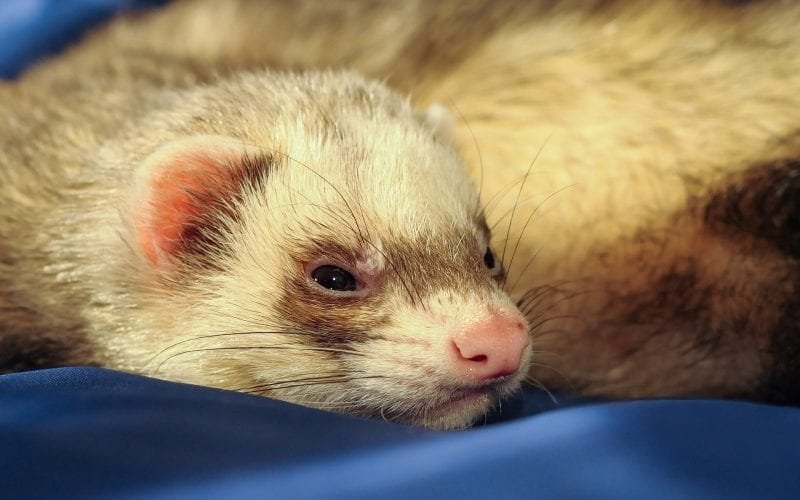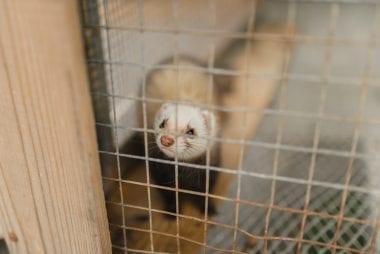Ferrets are truly wonderful pets, first having been domesticated nearly 2500 years ago! Like cats, we have often used ferrets to hunt rats and protect granaries. As such, the relationship between humans and ferrets has been a long and productive one. Now, as with most domesticated animals, ferrets are mostly kept as pets. People use them to hunt rabbits in some parts of the world. Other than that, they are mostly kept as friends and companions.
However, not everyone likes them. New Zealand, for example, has imposed restrictions on ferrets due to wild ferrets causing damage to native fauna. But even with those issues, ferrets are wonderful pets. As such, they require a certain amount of care to handle. In this article, we shall look into the kinds of vaccinations that are necessary for ferrets, as well as how to take care of them.
General Vaccination Details
Like most animals, vaccinating ferrets protects them from a number of diseases. It also stops them from passing on those same diseases to other ferrets. There are a number of vaccines available that work on ferrets, but legal issues can often interfere with vaccinating your pet properly. Even so, there are other vaccines that vets use off-label. These vaccines are safe and trustworthy, and will undoubtedly keep your pet ferrets healthy.
As such, there are two major illnesses that ferrets are susceptible to, namely the Canine Distemper Virus and Rabies. Ferret owners need not worry, though. While both these diseases are dangerous, they are easily countered with a proper vaccination schedule. Let us look into how these ferret vaccines will help protect your beloved pet.

Canine Distemper Virus
Despite being called the “Canine” Distemper Virus (CDV), it affects animals of the family Mustelidae as well, of which ferrets are a part. The virus affects multiple body systems, with the worst hit being the gastrointestinal and respiratory tracts. It can also spread to the brain and spinal cord in severe cases. This viral infection also makes it easier for secondary infections to spread, further damaging your pet’s health.
CDV is a fairly dangerous infection, and is easily contracted via inhalation. While other animals can survive the infection, ferrets are uniquely vulnerable. Scientists have observed 100% mortality rates in wild ferrets, making this an extremely important vaccine for your pet.
Symptoms
CDV presents with a number of concerning symptoms, with ferrets getting sick quite fast, depending on age. The most obvious symptoms are mild conjunctivitis and greenish-yellow discharge from the eyes. Your ferret might also get a fever up to 104 °F (ca. 40 °C). The clearest symptom, however, is the thickening and reddening of various body parts, including the skin of the chin, lips, anus and inner thighs. The foot pads also experience similar issues, turning thick and hard. These symptoms do not occur in any other disease, making them the clearest indication that your ferret is suffering from CDV.
Other symptoms include diarrhea, severe depression and strange behaviors, and sometimes seizures. The younger the ferret is, the faster the disease progresses to the central nervous system.
CDV has a near 100% fatality rate in ferrets. Even if your ferret manages to survive, it will need extensive nursing and a large amount of medication. Also, there are no good medicines available for CDV – most vets rely on immunity boosters to help the ferret heal on its own. As such, correctly vaccinating your pet is the best way to make sure it stays healthy. Let us now look into the types of ferret vaccines needed,
Vaccines Used In America
Due to legal and regulatory issues, there is only one vaccine approved for CDV in ferrets. Made by Boehringer Ingelheim Animal Health, based in Duluth, GA, PureVax Ferret is intermittently available. PureVax Ferret is a canarypox-vectored ferret vaccine. What this means is that it is made by editing the canarypox virus and using it as a delivery mechanism for the CDV vaccine. Since the canarypox virus cannot multiply in mammalian hosts, all it does is express the CDV genes that have been inserted into it. This triggers a powerful immune response, immunizing the dosed ferret without risking viral amplification.
As the vaccine does not contain any of the actual virus, post-vaccination risks are reduced. Ferrets may still suffer certain adverse reactions, but they are easily treated.
Some ferret vaccines were mostly made of live or attenuated viruses, and they have since been discontinued. These vaccines include Fervac-D, made by United Vaccines Inc and Galaxy D, made by Schering-Plough Animal Health/Merck.
Both these vaccines are modified-live virus vaccines, triggering immune responses by exposing them to a weakened version of the actual virus.
Vaccines Used In Rest of the World
PureVax Ferret has not always been widely available. In countries where it is hard to find, other vaccines have been used in an off-label manner to vaccinate ferrets. Boehringer Ingelheim’s Recombitek CDV is usually used for dogs, but is effective on ferrets as well. Like PureVax Ferret, Recombitek CDV is also a recombinant canarypox vaccine. Merck Animal Health’s Nobivac Puppy-DPv is a modified live virus vaccine. It is combined with the parvovirus vaccine, but that aspect is relatively useless since parvo does not affect ferrets. As the name states, it is primarily used on puppies, but it has been used clinically on ferrets.
Vaccination Protocol
Ferrets are usually given vaccines at 6, 10 and 14 weeks, followed by annual booster shots. However, new research suggests that two initial vaccines with less frequent booster shots may also serve the needed purpose, as the vaccine seems to stay effective for up to three years.
Rabies
One of the worst viruses a ferret can get, rabies is incredibly dangerous, and can spread to humans as well. There is no known cure for rabies, and if your ferret gets it, euthanasia is the only option. To avoid this outcome, vaccinating your ferret against rabies is incredibly important, not only for their health but also for yours.
Symptoms
Rabies presents with similar symptoms in any affected mammal. In ferrets, it usually starts with a change in behavior soon after contracting it. Affected ferrets may show signs of paranoia or nervousness, followed by disorientation and lethargy. The disease then progresses to hydrophobia, a fear of water. Ferrets become unable to drink water, and start suffering from dehydration. Around the same time, they also start hypersalivating, which manifests as excessive drooling, almost to the point of foaming. The saliva is full of the rabies virus at this point, so any bite, no matter how small, can be life threatening. This stage is followed by hyperaggression, in which the infected ferret starts biting and clawing everything in range. Loss of motor function and death soon follows.
Vaccines Used
Given the horrific nature of the disease, it is a blessing that it can be so easily avoided with a vaccine. Two vaccines are currently approved for use on ferrets. These vaccines are made of dead viral material from the rabies virus. They do not pose any real risk of viral amplification. The two ferret vaccines are Imrab 3 or Imrab 3 TF, manufactured by Boehringer Ingelheim, and Defensor 1 or Defensor 3, manufactured by Zoetis.
Vaccination Protocol
Healthy ferrets should be vaccinated at 3 months, with booster doses given annually. It usually takes around 30 days for the first dose to take effect, while ferrets are considered successfully immunized immediately after the booster dose. These ferret vaccines serve to help your pet stay as healthy as possible. However, some ferrets may suffer bad reactions to vaccinations. Let us see what to do in such cases.
Vaccine-associated Adverse Events
While vaccinations generally promote good health, some ferrets may suffer some adverse effects. These effects are usually hypersensitivity reactions or allergic reactions, known as anaphylaxis. In cases of mild reactions, ferrets exhibit rashes and itchy or red skin. Severe cases show symptoms like vomiting, fevers, heart failure or even death. However, the risk to most ferrets is extremely low. Less than 1% of ferrets suffer adverse reactions to vaccines, and most recover quickly with care. As such, owners should observe their ferrets for half an hour after vaccination, then alert the vet in case of adverse reactions.
Depending on the kind of reaction, the vet may then administer an antihistamine or a fast-acting corticosteroid to stop the allergic reaction. This is usually enough to help the ferret through whatever may be affecting it. However, having an adverse reaction to a vaccination makes future adverse reactions more likely. As such, you need to monitor your ferret carefully if it has suffered adverse reactions to vaccinations in the past. Ferrets make wonderful pets, and become a major part of our lives. We must repay them by taking good care of them, making sure they are healthy, and having lots of fun with them. These intelligent and helpful creatures are a great boon to us. Vaccinating them is one of the best ways to ensure that they live a long and healthy life.








